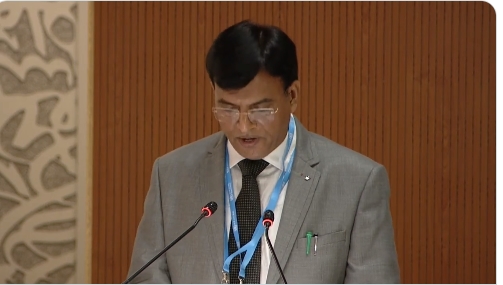Union Minister of Health and Family Welfare Dr. Mansukh Mandaviya addresses 75th session of World Health Assembly WHO HQ, Geneva
New Delhi: In a historic address at the 75th session of the World Health Assembly in Geneva at WHO HQ, the Union Minister of Health and Family Welfare and Chemicals and Fertilizers, Dr. Mansukh Mandaviya exhorted India’s commitment to build a more resilient global health security architecture. Underscoring the need to strengthen WHO, the Union Minister noted, “As highlighted by India’s Prime Minister, there is a need to build a resilient global supply chain to enable equitable access to vaccines and medicines, streamlining WHO’s approval process for vaccines and therapeutics and strengthen WHO to build a more resilient global health security architecture”. As a responsible member of the global community, India is ready to play a key role in these efforts, he added.
The Union Minister noted, “India believes that this year’s theme linking peace and health, is timely & pertinent because there can be no sustainable development & universal health & wellbeing without peace”.
However at the session, India also raised dismay and concern over WHO’s recent exercise on all cause excess mortality, where country specific authentic data published by the statutory authority has not been taken into account. In this regard, the Union Health Minister conveyed the collective disappointment of the Central Council of Health and Family Welfare, a representative body of Health Ministers from all States of India, as they passed a unanimous resolution regarding the approach and methodology of WHO on excess mortality reports.
The full text of address of the Union Health Minister is as under:
India believes that this year’s theme linking peace and health, is timely & pertinent because there can be no sustainable development & universal health & wellbeing without peace.
India firmly believes that WHO has a Central role to play in achieving the goal of Health for all in an objective & result oriented manner. It should be our collective endeavour to ensure that WHO is fit for the purpose to deal with contemporary realities. India has always constructively contributed to make WHO reflect the aspirations of Member States & that its processes must be driven by Member States.
In this context, it is with a sense of dismay and concern that India notes WHO’s recent exercise on all cause excess mortality where our Country specific authentic data published by the statutory authority has not been taken into account.
Consequently, the Central Council of Health and Family Welfare, a representative body of Health Ministers from all States within India, constituted under Article 263 of Constitution of India, passed a unanimous resolution asking me to convey their collective disappointment and concern with WHO’s approach in this regard.
There is a need to ensure centrality of WHO in global architecture & increase assessed contribution to WHO in a phased manner, but that should be linked to an accountability framework, value for money approach & genuine engagement with Member States.
India would like to highlight that besides equitable access to medical countermeasures including aspects related to intellectual property, need for cost-effective research, technology transfer and regional manufacturing capacities must remain an important focus area.
India’s Hon’ble Prime Minister Modi ji has highlighted the need for building a resilient global supply chain to enable equitable access to vaccines and medicines; the need for streamlining WHO’s approval process for vaccines and therapeutics and reform as well as strengthening of WHO to build a more resilient global health security architecture. As a responsible member of the global community, India is ready to play a key role in these efforts.

